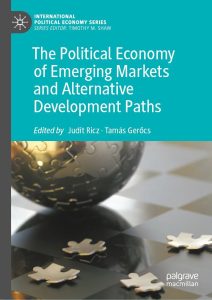Editors: Judit Ricz, Tamás Gerőcs
- Analyses emerging market economies’ alternative development trajectories
- Focuses on the ways statist economic systems are organized and coordinated
- Contributes to research on economic and developmental policy-making in the global semi-periphery
Part of the book series: International Political Economy Series (IPES)
Table of contents (13 chapters)
Middle-Income Trap and the Evolving Role of Institutions Along the Development Path
- Tomasz Mickiewicz
Pages 37-60- Anita Pelle, Gabriella Tabajdi
Pages 119-142The Belarusian Development Path: From Command Economy to State Capitalism?
- Piotr Kozarzewski, Aliaksandr Papko
Pages 143-170Rent Streams and Institutional Development in the (Semi-)periphery: Iran and Hungary
- Miklós Szanyi, Somayeh Sedighi
Pages 171-201Educational Developmentalism: A Key to the Success of the East Asian Developmental States
- Csáki György
Pages 229-256- Aslı Ceren Saral, Zeynep Ağdemir, Deniz Abukan
Pages 257-295Emergism as Ideology: Zimbabwe’s Ill-Fated Policies for an ‘Emerging’ Upper-Middle-Income Economy
- Tinashe Nyamunda
Pages 297-322Conclusion: The Contradictions of Dependent Development in Hegemonic Transition
- Tamás Gerőcs
Pages 323-334
This volume is the continuation of our research on economic and developmental policy-making in the global semi-periphery in the post-crisis cycle (see our two recently published volumes titled ‘Market-Liberalism and Economic Patriotism in Capitalist Systems’ edited by Gerőcs and Szanyi, 2019, Palgrave Macmillan and ‘The Post-Crisis Developmental State – Perspectives from the Global Periphery’ edited by Gerőcs and Ricz, 2021). Our new volume aims to be a contribution to the analysis of emerging market economies’ alternative development trajectories, as we explore the new perspectives on semi-peripheral dependent development since the Global Financial Crisis and especially amidst the new global pandemic, the COVID-19.
The scope of comparative capitalism research has also been altered accordingly to include the analysis of emerging economies outside the core of the world system, and to make intertemporal comparisons possible (such as to define and characterise historical waves of state capitalism). Still, we are convinced that to better understand the current wave of state capitalism and to explore its national varieties there is a need to critically reconsider existing theoretical approaches and methodologies, and to search for new ones, if necessary.
This book aims to be a contribution to the analysis of emerging market economies’ alternative development trajectories and explores new perspectives on semi-peripheral dependent development, especially amidst COVID-19.



